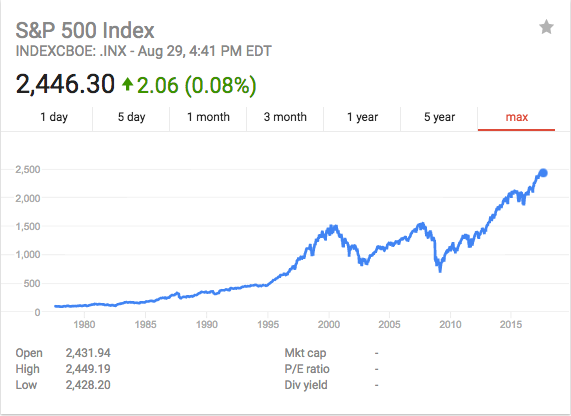Nearly 80% of millennials are not invested in the stock market. That’s scary! And it means a world of financial regret is on the horizon.
That statistic comes from a 2016 Harris poll which surveyed 500 American young adults (ages 18 to 34) and found the main reasons why they don’t own stock is:
- 40% don’t feel they have enough money to invest
- 34% don’t feel educated about it to know how
- 13% said student debt was the reason they haven’t invested
On one hand, some of these people have a point.
For example, it’s impossible to invest when you have close to $0 in your bank account after bills at the end of the month. And it goes against logic to expect someone to invest when they don’t know how to in the first place.
But I see some excuses at the bottom of this.
For the millennials who say they don’t have enough money, I’d ask them, “What have you done to solve this problem?”
They need to pick up another job, work on the weekend, stop wasting money on clothes and eating out, and save their money so they can invest.
Being uneducated about investing can only be an excuse for so long, too. Start educating yourself with a tool called the internet. It’s free!
And student debt is a big money sucker, but again—make more money, save more, and spend less so you can afford to both pay down student debt and invest in the stock market.
What I’m really advising is for these young adults to stop being soft and start hustling for their future so they can invest.
People miss out big time if they don’t own stocks. Here’s why.
9 Reasons To Invest In The Stock Market

Although many of these benefits can come from investing in the stock market in general, I’m specifically referring to investing in low-cost index funds that mimic the S&P 500, for example.
1) History shows you’re going to make life-changing money.
I don’t throw around the phrase “make life-changing money” lightly. It’s 100% true.
Investing in an S&P 500 Index fund, where you buy a tiny ownership of America’s top 500 public companies (give or take), is a great deal for your future.
If you invest in the stock market in your early twenties, there’s often a jackpot at the end of the tunnel. It’s literally like winning the lottery because you’ll end up with millions if you invest your money wisely.
Look at the graph below to see just the growth from 1980 until now. Better news is the graph remains pretty constant on average if you go back 100 years from now—up and to the right.

It’s no wonder Warren Buffett said this,
By periodically investing in an index fund, the know-nothing investor can actually out-perform most investment professionals.
If you don’t have faith in putting your money in the hands of the best public companies in America, who are you going to trust with your money?
Where can you find a better option that history backs up?
Exactly, that’s my point.
P.S. I’m not your financial adviser, but look at the graph one more time and make the only sound conclusion! History often repeats itself.
2) No active work is required to profit big.
Like the video above explains, when you set up automatic contributions (through your employer or own brokerage account) then all you have to do is sit back and let your index fund do the work.
How reassuring is that!? Maybe the greatest quality of investing in the stock market is it’s 100% hands off and doesn’t need your time to produce wealth.
It’s get even better when you do a simple comparison of all the time that’s required to build wealth in other areas.
Real estate: Renting out real estate is a pain in the butt if you’re renters aren’t angels (news flash: most people aren’t angels). You can expect property damage, late payments, missed payments, broken rules, and other nightmares that will really second guess your decision to be a landlord.
And even owning property is a headache because of the crazy expensive closing costs, taxes, property fees, HOA fees, and not to mention the monthly maintenance when the sink or shower breaks. It’s never fun to be nickled and dimed to death, which is a usually a regular occurrence in real estate.
Owning a business: If you’re not willing to be obsessed and let your personal desires die for the good of the company, your company isn’t going to generate significant profits compared to the hundreds of thousands and millions of dollars that investing in the market can.
You can work 80 to 100 hour weeks to build your company and hope it brings you wealth. Or invest in companies like Facebook and Amazon where other people are putting in insane work weeks to churn shareholders like you a profit while you relax on the weekend, and take steps toward financial freedom. But there are a lot of companies that have a profit sharing plan and will share profits with employees. They use profit sharing software like ShareWillow.
Working as an employee: The problem with working as an employee is you’re going to have to do some serious corporate ladder climbing to get salary raises and generate some kind of wealth. Even then, odds are you’re not getting a 7% to 10% salary increase every year like the stock market provides on average.
The stock market is the most reliable avenue towards wealth.
3) Incredibly higher rate of return than real estate.
You want to put your money where it can grow and produce more money for you, right? Then go with the stock market. And, don’t buy a home!
According to James Altucher, the commonly shared belief that buying a home is an investment is all too wrong. He points out that from 1890 to 2004, housing returned 0.4% per year. Yikes that’s criminal!
The list of reasons for a house’s poor return include all of the above like upfront closing costs, title insurance, moving costs. And then ongoing expenses like home maintenance when something breaks, property taxes, and the inability to easily move for a better paying job.
If you own stocks instead, you can kiss all of those annoyances goodbye. And not to mention, most importantly, come home with an average return on investment of 7% to 10% if you buy a S&P 500 Index fund.
4) Investing into index funds protects your money against inflation.
Inflation is an ugly beast. It robs you of your hard-earned money, well the true worth and purchasing power of that money, over time. And the worst part is it’s unstoppable, in a sense.
For example, if you keep your money as cash then it’s unstoppable and your dollars will always be worth less as the years pile up.
But there’s a solution. Can you guess the hero of the story?
Investing in the stock market, specifically a S&P 500 Index fund, protects your money from inflation eating away at it.
Reason being is the S&P 500 beats inflation the majority of the time and these types of assets are immune to inflation.
Plus, many companies can pass on the costs to their customers. So if you own shares of these companies, then you’ll get the profits as an investor (even if you take a small hit as a consumer).
This is just another example of why it pays to be an investor and not a consumer.
5) Buying stock is a liquid investment you can sell at any moment.
Run into a tight squeeze where you need immediate money?
Or do you ignore the sound advice to build an emergency savings fund and it bites you in the butt as your car breaks down or you lose your job?
While it’s never a good idea to sell an asset early and get in your own way of bringing in more profits, the fact that stocks are liquid investments can be a life-saver for some.
At any moment of any day, I can sell shares of my individual stocks or index fund and get cash in my checking account as soon as the transfer completes—usually two to three days.
The opposite is true with real estate and other types of investments.
Once that money is taken out of your bank account for a down payment or mortgage payment, then you have no chance of getting that money back on your real estate investment property in the immediate future.
Instead of selling your investment immediately and receiving the money in two to three days with stocks, you may have to wait two to three years to sell your asset if it’s real estate.
Liquid assets like stocks are even more valuable given the quality that you can sell them at any time.
6) Easy to diversity where your money is invested.
Assuming your name isn’t Richie Rich, the odds of you owning 25 different startup companies or 17 penthouse properties across the globe are slim to none.
Though you can own a sliver of 500 different companies or even thousands if you buy index funds listed in the stock market. For example, you can buy a car, technology, food, retail, shoe, farm product, defense, and more companies than you can possibly remember to stay diverse.
Reason I bring that up is diversity is key for the average investor who is scared of losing all of their money or loses sleep when their investments are volatile.
A well-diversified investment portfolio protects against volatility and too much risk, which is hard to come by in other asset types.
7) Get taxed lower for long-term capital gains.
Investing in the stock market doesn’t mean the taxes on your returns completely go away. (Wouldn’t that be a blessing?)
But the taxes you pay on long-term capital gains (stocks you own for longer than 12 months) are significantly decreased compared to getting taxed on regular income.
Add this to the list of reasons it’s in your best interest to invest. If the government incentivizes investing with these tax policies and you still don’t do it, something is wrong with you.
Just don’t buy and sell your stock earlier than a year of holding it or else you’ll be taxed higher since it’d be a short-term capital gains tax (any stock sold before you’ve had it for at least 12 months).
Oh, that’s not it. If your investments lose money, you can also lower your tax bill using those losses. The goal of investing is not to lose money, but if it happens then reducing your tax bill is a decent compromise.
A wealth growing vehicle that also reduces my taxes is a slam dunk investment. This opportunity is yours for the taking as well.
8) It’s the only way to own a percentage of the products and services you regularly buy.
Eat at McDonald’s every day (like my dad does)? You can own a piece of them buy buying MCD.
Are you a big texter and talker on the phone? You can buy shares in Verizon (VZ).
Always enjoy a nice Disney movie to take you back to your childhood? Buy shares in ticker symbol DIS.
The ability to purchases ownership of a company you use all the time is another thing investing in stocks has going for it.
Now would I put all of my money in only products or services I buy? No, but it is a nice mental exercise to purchase ownership of a company that you use all of the time.
Because, in a way, you’re kind of buying from yourself and profiting from yourself. That’s legit!
9) It’s easy to get your feet wet with a small amount of money.
Want to be an angel investor to invest in a hot new startup company? Can’t happen unless you have an annual income of over $200,000 and a net worth of $1 million. Poor people not invited.
Want to invest in Grant Cardone’s real estate fund? Sorry, tough luck. You also need to be an accredited investor.
Want to buy your own multi-family real estate property and rent it out? Good luck collecting that $100,000 down payment to secure the property on top of the mortgage payments every month.
The system blocks out the little investors who can’t make any moves to grow their wealth.
However, it’s easy to start small when buying stocks.
You don’t need to be an accredited investor to invest in companies like Facebook, Amazon, Netflix, and other giant companies like GE.
So if you only have $600 to invest, perfect. Buy $600 worth of shares into a Vanguard index fund and slowly increase your position over time by buying more shares going forward.
Heck there are even new apps out there that will automatically help you invest spare change from purchases like Acorns.
Where buying other assets like real estate and startup investing limit everyone but the rich from participating, anyone can get started investing with as little as a $100 give or take.
And for any parents out there, it’s wise to put your kid’s birthday money into an index fund to get them off on the right start. A little money invested now can likely snowball into millions.
You Reap What You Sow
Two different financial realities await you.
The good news is you’re in control of your financial future. You get to decide the plot line.
If you desire to retire early, have millions in the bank to spend during your golden years, and live a comfortable retirement with your family, all you need to do is start investing.
The bad news is you’re also in control. Meaning you can make the wrong money decisions, not invest in the stock market, and be left with the staggering consequences.
Retirement isn’t fun if you have no money to afford to do anything entertaining. Then post-work life becomes the biggest drag of your life. Some people stop living to such a degree that they wish for death.
So from one young adult to another, make the right choice.
Have a long-term view about life. Buy some shares in a S&P 500 Index fund. And get the financial markets working for your money, not against your money.
Then you’ll give yourself a great opportunity for a happy ending: reaching financial freedom.


